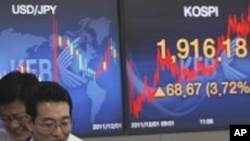U.N. economic analysts say growth in Asia is expected to remain flat for the rest of 2015. The U.N. Regional Economic and Social Commission [UNESCAP] said the U.S.-led trade group, the Trans Pacific Partnership, and China’s Asian Infrastructure Investment Bank [AIIB] are set to play leading roles to foster regional growth.
The Asia-Pacific region’s once fast-growth economies are facing challenges caused by economic slowing in China and Europe.
The U.N. Economic and Social Commission for Asia and the Pacific annual survey says regional growth will remain flat at close to six percent in 2015 and 2016.
But UNESCAP Executive Secretary Shamshad Akhtar said encouraging signs include indications of recovery in Japan, and China’s growth holding steady around seven percent.
“The East and North Asia signs are of a modest pickup in Japan ... hopefully it will result in stronger growth momentum. China’s gradual transition to diversify sources of demand from investment to domestic consumption and developing services’ sectors will eventually have high pay-offs for economic rebalancing.”
But North Central Asia, centered on the Russian Federation, is a concern because of sharply slower growth due to lower oil prices and economic sanctions over the conflict in Ukraine and Crimea. U.N. economists forecast the sub-region’s growth will contract by 2.9 percent this year and another one percentage point next year.
Akhtar said the Asia-Pacific region’s challenges could be eased with the U.S.-backed trade and investment treaty the Trans Pacific Partnership and the China-led Asian Infrastructure Investment Bank.
“TPP in the long run would definitely be very positive, as I see, because anything to do with trade, investment liberalization, getting procurement contracts to be much more open; transparent, which is what TPP is, is more inclusive in terms of its agenda and quite expansive,” said Akhtar.
The TPP agreement also is seen as spurring stalled global trade talks.
Akhtar is upbeat about the Asian Infrastructure Investment Bank, which Beijing leads, playing a major role in funding gaps for infrastructure in the region.
“AIIB is all over positive, in my view, and the region’s infrastructure requirements is estimated anywhere between $800 billion and $1 trillion depending on what sources you look at, and sustainable development requirements add to that burden," said Akhtar. "If AIIB can be operational fast it can take the burden off.”
The U.N. survey also noted significant reductions in extreme poverty, but found evidence of rising income inequality and slow employment growth, especially in urban areas of major developing countries.




